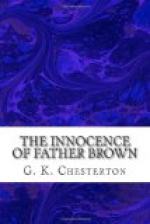The voice went on: “Olivier, as you know, was quixotic, and would not permit a secret service and spies. The thing, however, was done, like many other things, behind his back. It was managed by my old friend Espado; he was the bright-clad fop, whose hook nose got him called the Vulture. Posing as a sort of philanthropist at the front, he felt his way through the English Army, and at last got his fingers on its one corrupt man—please God!—and that man at the top. St. Clare was in foul need of money, and mountains of it. The discredited family doctor was threatening those extraordinary exposures that afterwards began and were broken off; tales of monstrous and prehistoric things in Park Lane; things done by an English Evangelist that smelt like human sacrifice and hordes of slaves. Money was wanted, too, for his daughter’s dowry; for to him the fame of wealth was as sweet as wealth itself. He snapped the last thread, whispered the word to Brazil, and wealth poured in from the enemies of England. But another man had talked to Espado the Vulture as well as he. Somehow the dark, grim young major from Ulster had guessed the hideous truth; and when they walked slowly together down that road towards the bridge Murray was telling the general that he must resign instantly, or be court-martialled and shot. The general temporised with him till they came to the fringe of tropic trees by the bridge; and there by the singing river and the sunlit palms (for I can see the picture) the general drew his sabre and plunged it through the body of the major.”
The wintry road curved over a ridge in cutting frost, with cruel black shapes of bush and thicket; but Flambeau fancied that he saw beyond it faintly the edge of an aureole that was not starlight and moonlight, but some fire such as is made by men. He watched it as the tale drew to its close.
“St. Clare was a hell-hound, but he was a hound of breed. Never, I’ll swear, was he so lucid and so strong as when poor Murray lay a cold lump at his feet. Never in all his triumphs, as Captain Keith said truly, was the great man so great as he was in this last world-despised defeat. He looked coolly at his weapon to wipe off the blood; he saw the point he had planted between his victim’s shoulders had broken off in the body. He saw quite calmly, as through a club windowpane, all that must follow. He saw that men must find the unaccountable corpse; must extract the unaccountable sword-point; must notice the unaccountable broken sword—or absence of sword. He had killed, but not silenced. But his imperious intellect rose against the facer; there was one way yet. He could make the corpse less unaccountable. He could create a hill of corpses to cover this one. In twenty minutes eight hundred English soldiers were marching down to their death.”
The warmer glow behind the black winter wood grew richer and brighter, and Flambeau strode on to reach it. Father Brown also quickened his stride; but he seemed merely absorbed in his tale.




